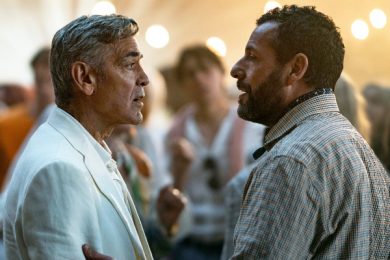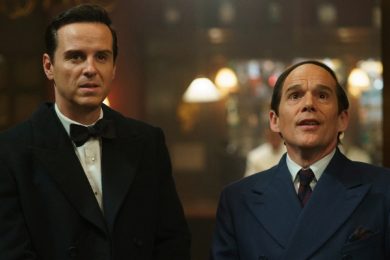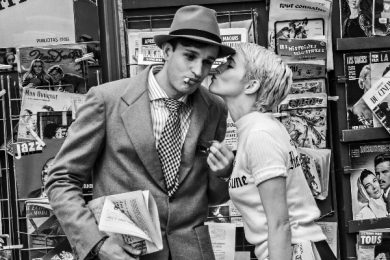Most of the charm of Into The Wild comes from the persuasiveness of Christopher McCandless. Chris is an adventurous young man, just graduating from Emory University with great grades, and a full fund for his future years in law school. Unfortunately, Chris doesn’t believe in that kind of life. He cashes in his law school fund, sends it to charity, and decides to go off on a life of “Ultimate Freedom”.
Soon into his journey, Christopher McCandless (Emile Hirsch) changes his name to Alexander Supertramp. He meets two wayward hippies, Jan and Rainy (Catherine Keener and Brien Dieker), and helps them in their unconventional, sometimes rocky marriage. He gets a job farming with the boozing, joking Wayne (Vince Vaughn), to whom he unveils the big plan of his journey: that is to go to Alaska, and live alone in the wilderness; nothing but him and the nature he adored in so many books by Henry David Thoreau and Jack London.
This journey is sparked by all those books and writers, but we learn through interesting flashbacks, that Chris’ journey is also spurred by the emotional wreckage his parents made him and his sister (Jena Malone) endure during their childhood. His father (William Hurt) is a successful scientist, and his mother (Marcia Gay Harden) a boozer who started off as her husband’s mistress in his first marriage–until she got pregnant. Chris has decided that he does not want to live the life that they have planned for him, because they are no more than materialistic phonies. Instead, he puts them through two years of torture of wondering where he is.
Sean Penn wrote the screenplay based on Jon Krakauer’s book of the same name. The book is the true stories of McCandless, told through all the people whom he met on his journey. The film is striking in it’s portrayal of McCandless. We believe in his journey, even though we believe, like all the people he meets on the way, that it is doomed. He gets to Alaska, finds an abandoned bus and makes it his home. He’s equipped with nature-survival books (which he doesn’t read very well), and all the novels that had inspired him on his trek. Everything is like how he dreamed, until he becomes trapped within his own isolation.
It seems Sean Penn, as he gets older, has become much less angry, and in the process, has become a much more rounded filmmaker. The film’s beauty goes along with Penn’s apparent adoration for the material. He creates the atmosphere of Chris so wondrously, and sometimes dangerously, suddenly the life of a “nature man” doesn’t seen like such a bad idea, if only for about an hour. Penn’s film though, is made so humane through the incredible performance of Emile Hirsch (known for little before other than Alpha Dog and The Girl Next Door), whose performance as Chris is more than acting. Every year, there is a performance so good you tend to worry about the health of the actor (Leonardo DiCaprio in The Aviator two years ago, for example); this is that kind of performance.
The movie’s most touching moment, comes when Chris has come toward the end of his trip, and befriends a religious, war veteran Ron Franz (Hal Holbrook). Ron lost his family when they were killed by a drunk driver, and he has lived alone in his home ever since. He takes in Chris like everyone before, and cares for him like a grandfather would. Chris tries to teach him about the wonder of the wilderness, Ron tries to teach him about the importance of forgiveness (in which Chris refuses to do with his parents). Holbrook’s entrance comes about two hours into the film, but he delivers such a warm, emotional performance that is the best of many highlights within the movie. Like all the others, Chris soon abandons him too, leaving Ron alone once again.
The movie is a majestic experience, in showing a lifestyle worth living– a life of transcendentalism. Chris doesn’t think he is homeless, he thinks he is free from homes. Penn acutely acknowledges this, because at all the points Chris tries to work his way back into society, he cannot function (he quits a small job he has at Burger King because they require him to wear socks). It’s not that Chris is an incredibly skilled woodsman–he is never able to successfully hunt anything other than squirrels and berries–but the effort seems good enough. This is a film that stays with you long after you’ve finished watching, mostly pondering the incredible pain it must have taken to make Chris want to abandon society. Every person he meets really become enthralled by his zeal, and they worry and long when he leaves. Yet, Chris seems unmoved and continues the set path he’s made for himself.
The movie is a bit bloated–it’s safe to assume that 35% of it’s 150 minutes is taken up by slow-motion, and music-filled montages detailing parts of nature and atmosphere–but since we are so sucked in by Penn into the world of Christopher McCandless, it doesn’t seem to matter much. The film seems to adopt the personality of McCandless, free-spirited and uncompromising, and because of that, extensive looks into the wilderness seem almost necessary. McCandless’ journey will come off to some as selfish, but this film documents a man who feels he must dedicate his life to something more than material objects. If that is not noble, I do not know what is.
Directed by Sean Penn









